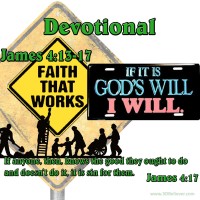

Read: James 4:17 |
“If the Lord wills” was a common Greek expression (Acts 18:21; 1 Cor. 16:7), and a Latin motto, “Deo Volente,” (DV) for centuries for committed, pious Christians. The expression survived through the years. In fact, my 90+ year-old Grandmother still says, “If it is the Lord’s will” from time to time. The phrasing acknowledges that God’s will is supreme and the uncertainty of tomorrow is in His hands.
We cannot count on the future, for tomorrow is not promised. The only one who knows the future is God. We show wisdom by recognizing God’s hands on our future and applying our energy in the here and now to carry out our Christian duty. [Spurgeon, “God’s will for the Future”]
Boasting about Tomorrow Displays a Mistaken Confidence
In this passage, James warns believers that boasting about tomorrow can display a mistaken confidence in self when stated without acknowledging God. In essence, we exclude God from our plans when do not allow Him to guide our plans. If we try to cut God out, either by a deliberate action or unconscious inaction, the result is sin. We can maintain a balance by keeping the will of God foremost in our hearts and minds.
Our future is conditional to God’s will, not ours. Our charge is to go where He leads us, when he leads us and allow Him to take care of the tomorrows.
Do what you know do, to avoid sins of commission and omission
In James 4:17, James uses the word “Then” to link back to his comment in James chapter one. Paraphrasing his points from the latter parts of this chapter, we can say “Hear the Word, Listen to the Word, Do what the Word Says – Repeat (link)”. Now, he is saying if we know what to do, then do it – otherwise it is a sin.
We are to stay close to God and understand and do His will day-by-day. Doing His will is the present duty of every believer. As we mature in Christ, it is important to develop an urgency to accomplish the revealed will of God for our lives. Frankly, we have less time left on this earth than we did yesterday. Just as a clock reminds us of the fleeting time as it echoes a “tick-tock”, so should the Lord’s will echo in our hearts and mind as “Now! Now! Now! Do My will Now!”[Spurgeon, “God’s will for the Future”]
To delay doing what we know is His will or to be indifferent is a sin of omission. To disobey God willfully is a sin of commission. Both will come into the judgment of God. Our job as believers is to finish everything God gives us as soon as we know His direction. It is our duty because we do not have a promise of tomorrow in which to finish the task.
There are two great certainties about things that shall come to pass—one is that God knows, and the other is that we do not know.
Since we do not know, we might be tempted to take James’ words at the extreme. We can either become “Hyper Holy”, and preface everything we say and do with “If it is God’s will” or we can be a “Couch Potato Christian” and wait for His return because we are not sure if it His will. This passage does not call us to either extreme.
We are to keep God central in what we are doing and yield to His guidance. We are to translate into immediate action the will of God we understand and seek His guidance as we follow Him. Saying “if the Lord wills” is not to be a catch phrase or trivialized; it is to be a lifestyle. DV my brother, DV my sister. Now! Now! Now! Do His will, Now!
Questions:
1.Discover –
a. How central is God in your plans for tomorrow and next year? Discuss with a prayer partner
b. Which type of sin do you commit more often – sins of omission or sins of commission? Why?
2.Develop –
a. When God puts something on your heart to do or take care of, what is your average reaction time? A minute, a day, a month, a year or have you even started yet.
b. How do you practice dependence on God? Share some examples in the comment box below.
c. What do you need to do to be better at aligning yourself with His Will?
3.Demonstrate –
a. When God puts something on your heart to do or take care of, what is your average reaction time? A minute, a day, a month, a year or have you even started yet.
b. Share with prayer partner or class member an unexpected consequence you experienced by following God’s will even when it led in an area you thought you did not want to go.

I see two dynamics in the reaction time between God’s prompt and my obedience: (1) Am I in my comfort zone at the time of the prompt? and (2) Is God’s prompt sending me outside of that place of comfort? I believe Jesus was in His “comfort zone” when he was teaching and healing. He was in complete control as He was doing His Father’s will, Jn.6:38. From Gethsemane to the cross, everything changed. He had willingly turned himself over to the hands of sinful men to do with Him as they pleased. Even in this, He did the Father’s will, giving His life a ransom for all. Have I turned down God’s prompting because I felt it would be too painful? Unfortunately, I have, to my shame.